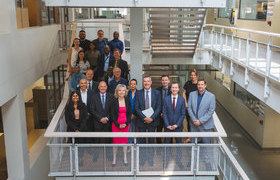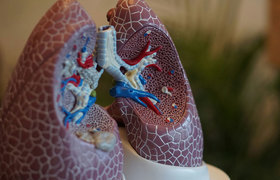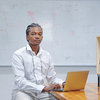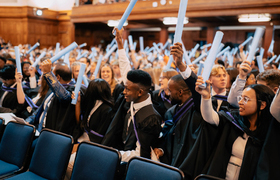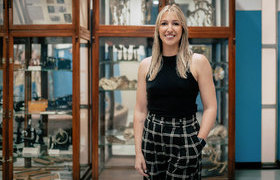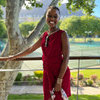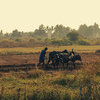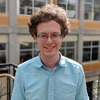Transitions, hope and possibilities
25 May 2018 | Story Helen Swingler. Photo Robyn Walker.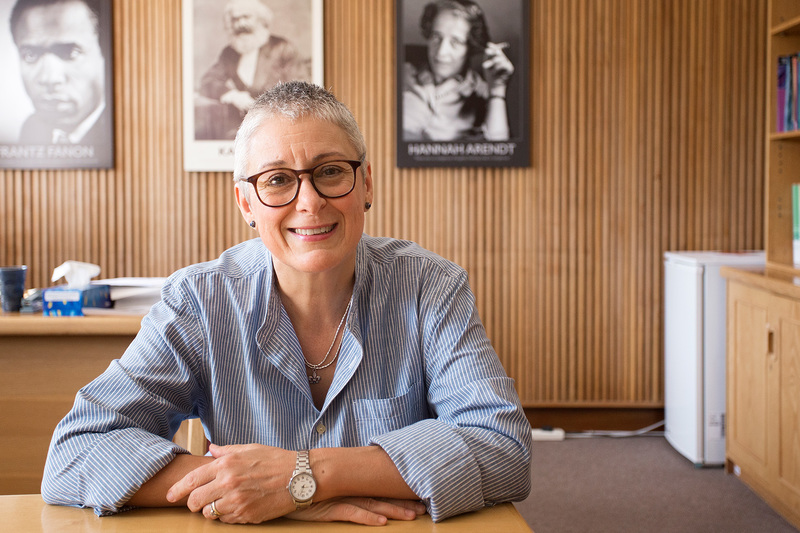
After four eventful months into her job as UCT’s new Deputy Vice-Chancellor for Teaching and Learning, Associate Professor Lis Lange speaks to Helen Swingler about her background, thinking and goals to bring teaching and learning on par with UCT’s world-class research. She also speaks about hope and possibilities in a time of transition.
You were born and raised in Argentina. What brought you to South Africa?
I came to South Africa to do a PhD in history at Wits University. By the time I’d finished I’d fallen in love with the country. I arrived here in March 1990 (and my accent is still the same!), immediately after the announcement of the political unbannings in February. It was a very exciting time to be here … I’d done a Master’s in African Studies at El Colegio de Mexico. I started specialising in South African history and politics and came specifically to do a doctorate on the white working class. Afterwards I was lucky to find a job at the Human Sciences Research Council.
You were Vice-Rector for Academics at the University of the Free State. What was it about the UCT opportunity that made you think: this is for me?
Everybody wants to work in the best university in the country … But I also had the impression that the best university in the country still had some areas it could improve. And for me, the interesting thing is to see whether I can challenge UCT’s (lovingly said) arrogant sense of itself and see where we can do some things differently. If we want to be a world-class university we want to have world-class ‘many things’ that I don’t think we have currently. I would like to help by doing that.
UCT has a very different institutional culture from UFS. How have you found your first four months here, notwithstanding some objections to your appointment?
The first part of my tenure was complicated, but the university in general, certainly the Council and my colleagues, has been very supportive. I came here to do a job, and I think people are realising that I can do the job and that I have a level of energy and enthusiasm and commitment to the university and the general project of transformation, which might be useful for what we need to do. I like this place. It is very different from UFS. There is much more contestation, which I like. The students are extremely articulate and interesting – and interested. So, I am happy to be here. We are in a transitional moment at the university and all transitions are complex because the new is not yet there and the old is still ‘moving’. But for me all transitions are moments of hope and possibility. In my area I feel that we are making progress and I really have a strong sense of possibility. This is a fantastic place. People don’t realise the extraordinary concentration of capacity per square metre that this university has. And that is like a blessing. I think we need to hone that.
“People don’t realise the extraordinary concentration of capacity per square metre that this university has. And that is like a blessing.”
Describe yourself and your management-cum-working style.
I’m fairly relaxed but I’m pretty impatient with inefficiency and with mediocrity. I lead from the front; I lead from the back; and if that is insufficient, I push, and I occasionally swear too – in all languages available to me! I am very, very passionate about what I do, so I bring myself entirely into the job. And I expect the same commitment from the people I work with. But I like helping people to learn; I think I am good at developing and helping people to grow and find their strengths.
What did you identify as UCT’s strengths and weaknesses in teaching and learning, and what is your vision for this portfolio?
With the background work that I did in preparation for this position, I have used these four months to familiarise myself with how the university works, to read more, to talk to people and to truly get an understanding of teaching and learning. I started by visiting the faculties and talking to the academics and HoDs, and all of this has been very useful. I put together a document called “Stretching Excellence” as a ‘peaceful conversation starter’ with the different faculties. What the document does say is that as good as UCT is in the research area, in teaching and learning there are things that we need to do.
I have identified a number of things and we are discussing these with the academics. I think there’s consensus that these are the things we need to do. These concern the different success rates between black and white students; the throughput; the differential, which is the gap in achievement between black and white students; and, finally, something that caught my attention: the fairly large number of students that graduate with third-class passes. There’s a big gap between the very large number – an amazing number compared with other institutions – of first-class degrees and cum laudes, and then a bit of a plateau in the marks. And then there’s the overall experience of students: how they feel about the university, whether they feel acknowledged and comfortable; whether they are really engaged in their learning. These are the things we are working on with the deans. It’s been good to work with them as well as the academics. Some of the HoDs have invited me to visit their departments and I’m really enjoying that.
Minister Naledi Pandor announced R1 billion will go towards a task team to investigate how tertiary institutions are responding to the challenge of the Fourth Industrial Revolution. How does this impact on teaching and learning?
One must be cautious about some of the issues because South Africa is a very contradictory society, with enormous differences. So, we first must understand what the Fourth Industrial Revolution implies for a country like ours. But there are issues we need to start tackling; all our professional degrees – and our general degrees too – need to be in touch with the changes in the work environment. There are professions and occupations and ways of being a professional that didn’t exist 10 years ago. So how do we adapt the programmes we offer, the way we structure our degrees to those types of things? What are the degrees that we are not offering, that we should, and what are the degrees that need to be dusted off a bit and adapted to better meet new needs and expectations?
I’m interested in the posters you’ve hung in your office: Karl Marx, Hannah Arendt and Frantz Fanon. What do they tell us about you?
I’m a Marxist. I have been since I can remember, so that poster of Marx has been travelling with me forever, from job to job – a present from a dear friend of mine. I had the Arendt poster made. Besides the work I do in higher education, my actual passion is the thinking of Hannah Arendt, so I am constantly studying her work. I admire many aspects of her life and particularly her notion about thinking and the problems that lack of thinking can create in society. And Fanon because he’s a long-standing influence in my way of looking at the world. … Fundamentally I’m interested in the importance of his thinking and in the recognition of humanity; what it means to be human. The quotes on each poster talk to the same story. The Marx quote, “The philosophers have only interpreted the world in various ways. The point, however, is to change it”; the Arendt quote, “There are no dangerous thoughts; thinking itself is dangerous”; and the Fanon quote, “O my body, make of me always a man who questions”, are about the same thing. I’m very concerned about the connection between thinking and ethics. Thinking and ethical are what I try to be.
“I’m very concerned about the connection between thinking and ethics. Thinking and ethical are what I try to be.”
How did your family respond to the news that the Mother City would be their new home? I am assuming they moved south with you.
My children, Benjamin and Buleng, are here. They were at this university. Benjamin did media studies and Buleng studied drama, but they are now citizens of Cape Town. So, they were very happy that we were going to come and join them. That was one more reason to move. And Buleng has a partner and a child, so I have a grandchild here.
Are you enjoying our ‘dry city’?
I have never had so many buckets in my house! As a contribution to the city I imported water from Bloemfontein. I came down with 150 litres of water, so my car was unbelievably heavy. For the first 10 days of my stay in Cape Town I used very little of the city’s water!
Read the VC Desk on Assoc Prof Lis Lange’s appointment...
 This work is licensed under a Creative Commons Attribution-NoDerivatives 4.0 International License.
This work is licensed under a Creative Commons Attribution-NoDerivatives 4.0 International License.
Please view the republishing articles page for more information.
Research & innovation
